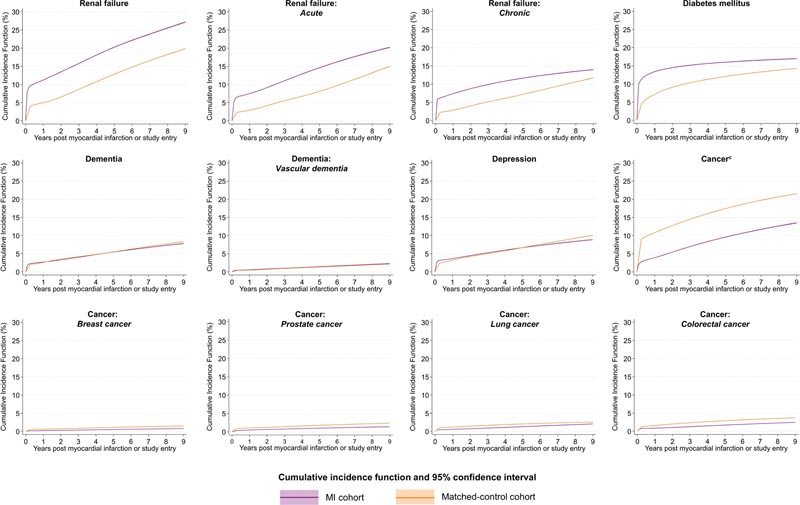Leeds University
A new study shows that having a heart attack significantly increases the risk of developing other serious long-term health conditions.
Researchers at the University of Leeds have analyzed more than 145 million records covering every adult patient admitted to hospital over a nine-year period to establish the risk of long-term health outcomes after a heart attack, in the study. largest of its kind.
While heart attacks are a serious and life-threatening condition, the British Heart Foundation estimates that today, more than seven in 10 people survive, provided they receive prompt, emergency treatment to get their blood flowing again. cardiac muscle.
However, previous research has shown that heart attacks can have implications for patients’ health, including other conditions that affect the heart and circulatory system, but also conditions that affect other parts of the body and mental health conditions.
The new research shows that patients who had a heart attack developed more illnesses at a much higher rate than people of the same age and sex who had not had one.
Up to a third of patients developed heart or kidney failure, 7% suffered new heart attacks and 38% died from any cause within the nine-year study period.
Heart failure, atrial fibrillation, stroke, peripheral artery disease, severe bleeding, kidney failure, type 2 diabetes, and depression occurred more frequently in people who had a heart attack compared to those who did not. suffered from it, but the risk of cancer was lower overall and the risk of dementia was no different overall.
The study also identified that people from more disadvantaged socioeconomic backgrounds were more likely to die or develop serious long-term health problems after a heart attack. In particular, people from more deprived backgrounds were more likely to develop heart and kidney failure compared to people from less deprived backgrounds of a similar age.
Lead author Dr Marlous Hall, associate professor of cardiovascular epidemiology at the Leeds School of Medicine and Multimorbidity Research at the Leeds Institute of Data Analysis (LIDA), said: "There are around 1.4 million heart attack survivors in the UK who are at high risk of developing further serious health conditions."
"Our study provides accessible online information on the risk of these health outcomes for specific age, sex and socioeconomic deprivation groups so that people who survive a heart attack can be well informed about their future risks, in order to support making informed decisions about health care with your doctor."
"Effective communication about the likely course of the disease and the risk of long-term adverse outcomes between patients and healthcare professionals can promote positive lifestyle changes, encourage patients to adhere to treatment, and improve understanding and quality of life of the patient.
"Our study highlights the need to review individual care plans to take into account the increased demand for care caused by survivorship."
The researchers analyzed the records of all people aged 18 or over who were admitted to one of the 229 NHS Trusts in England between January 1, 2008 and January 31, 2017. This amounted to 145,912,852 hospitalizations between 34,116,257 people. There were 433,361 reports of people having a heart attack for the first time. The average age of heart attack patients was 67 years and 66% of patients were men.
The study looked at 11 non-fatal health outcomes detailed below, in addition to death from any cause, and compared the results to a control group of 2,001,310 people.
Health outcomes
The research showed a significantly increased risk of developing some diseases after a heart attack compared to the control group of patients.
It was most likely heart failure , as 29.6 percent of the study group developed the condition within nine years of the heart attack, compared to 9.8 percent of the control group during the same time frame.
Renal failure developed in 27.2% of patients in the study group, compared with 19.8% in the control group.
About 22.3% of the study group developed atrial fibrillation , compared to 16.8% of the control group.
New hospitalizations for diabetes were observed in 17% of the study group, compared with 14.3% of the control group.
Other conditions were:
- Severe bleeding—Study group: 19%; Control group: 18.4%
- Cerebrovascular disease: study group: 12.5%; Control group: 11.6%
- Peripheral arterial disease—Study group: 6.5%; Control group: 4.06%
- Death from any cause—Study group: 37.8%; Control group: 35.3%

Time-continuous adjusted absolute risk of renal failure, diabetes mellitus, dementia, depression and cancer after myocardial infarction compared with matched controls in England. Calculated according to the standardized CIF, treating non-outcome death as a competing risk, adjusted for non-linear age using restricted cubic splines, sex, calendar year and deprivation score and a time-dependent effect for MI versus matched controls. Full CIFs and CIs by time point are provided in Table S5, and sensitivity analyses, in which follow-up was restricted to begin a minimum of 2 months after study entry, are presented in Figure S2 and Table S6. Numbers at risk at 1, 5, and 9 years of follow-up are provided in table S7. b Individuals were matched according to year of age, sex, month and year of hospital admission, and NHS Trust using a 5:1 risk set matching approach. It includes all types of cancer (ICD10 codes C00–C97), that is, this category is not limited to the sum of breast, prostate, lung and colorectal cancers). CI: confidence interval; CIF: cumulative incidence function; ICD, International Classification of Diseases; MI: myocardial infarction; NHS, National Health Service.
Overall, hospitalization records indicate that depression occurred in 8.9% of people after a heart attack, which was 6% more likely after a heart attack than in the control group. Women were more likely to develop depression after a heart attack than men, especially those who had their heart attack at a younger age. 21.5% of women who were under 40 years old at the time of their heart attack had a history of hospitalization for depression, compared with 11.5% of men in the same age category.
There was no overall difference in the risk of dementia after a heart attack compared with the control group. Although the risk of vascular dementia was more likely in the study group, the difference observed was small (study group 2.3%; control group 2.1%).
Unlike other health outcomes, the research showed that cancer was less pronounced in the study group than in the control group. About 13.5% of the study group developed cancer after their heart attack, but this compares with 21.5% of the control group. Researchers believe there are likely many factors affecting this finding, but the specific reasons for fewer cancers after a heart attack are still unclear and require more research.
Morag Foreman, chief discovery researcher at Wellcome, said: "This research provides valuable information about the types of support and interventions that may be needed for patients after a heart attack, helping both doctors and patients make informed decisions. informed decisions during recovery and beyond.
"This research shows how cohort studies and analysis of large data sets can improve our understanding of major health challenges and demonstrates the value of supporting discovery research in the field of population and public health. Tailored that improve survival rates after a heart attack, understanding the longer-term impacts on physical and mental health are crucial."
Professor Bryan Williams, scientific and medical director of the British Heart Foundation , said: "While more people than ever survive heart attacks, there can be long-term consequences. Especially after a major heart attack, people can suffer irreparable damage. to the heart, putting them at higher risk for heart failure.
"This study sheds more light on how heart attacks are associated with a higher risk of developing other serious health conditions, including heart failure and atrial fibrillation. It also found that those from more socioeconomically disadvantaged backgrounds are at greater risk of suffering more heart problems. "health after a heart attack and at a younger age. Research suggests that these patients may benefit from additional support and monitoring to help reduce their risk of developing further health conditions."
“It is vital that the NHS has the resources, including staff, infrastructure and equipment, to provide the care patients need to help them stay in the best possible health for longer.”
Conclusions In this study, up to one-third of patients with myocardial infarction (MI) developed heart failure or kidney failure, 7% had another AMI, and 38% died within 9 years (compared with 35% deaths among paired individuals). The incidence of all health outcomes except dementia and cancer was higher than expected during the normal life course without AMI after adjustment for age, sex, year, and socioeconomic deprivation. Efforts aimed at preventing or limiting the accumulation of multisystem chronic diseases after myocardial infarction are needed and should be guided by the specific demographic risk tables derived from this study. |
Final synthesis
Why was this study carried out?
Myocardial infarction (MI) can have a significant long-term impact on people and result in a wide range of additional health conditions.
Existing studies have focused on determining the short-term risk of a second heart attack, stroke or major bleeding, but there was a lack of research describing the long-term risk of important health outcomes for specific age, sex and deprivation groups.
Robust, nationally representative information on a wide range of long-term health outcomes after a heart attack is critical for the development of treatment recommendations, which take into account an individual’s specific risk.
What did the researchers do and find?
From the population of 56 million adults in England, we analyzed the hospital records of 34 million adults admitted to hospital (constituting 145 million admission records) to investigate long-term health outcomes after a heart attack in compared to people without a heart attack.
Of 433,361 people who had a heart attack, up to a third developed heart failure or kidney failure, 7% had further heart attacks, and 38% died within the 9-year study period.
Heart failure, atrial fibrillation, stroke, peripheral artery disease, major bleeding, kidney failure, diabetes, and depression occurred more frequently in people who had a heart attack compared to those who did not have a heart attack , but the risk of cancer was lower overall and the risk of dementia did not differ overall.
What do these findings mean?
Efforts should be made to prevent or limit the development of long-term health outcomes following a heart attack, the likelihood of which differs depending on an individual’s age, sex, and deprivation.
These findings are based on the entire population of adults admitted to hospital in England, address limitations of previous studies, and can be used to inform preventative strategies tailored to specific individuals surviving a heart attack.
The study was limited to hospitalization data only; therefore, some diagnoses made outside the hospital may have been missed.
The work is published in the journal PLOS Medicine .
















